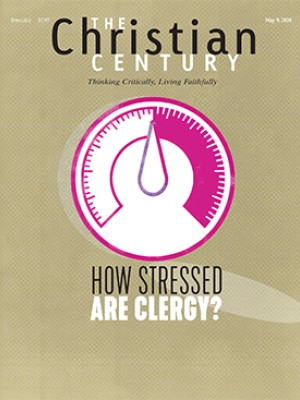What makes A Wrinkle in Time Christian?
Some white Christians have complained that Ava DuVernay’s film is not faithful to Madeleine L’Engle’s book. A lot of people of color, however, have been feeling this movie deeply.

Works of art can become holy to people, and these “sacred texts” are miracles. A book, a song, a film, an image created by someone decades or centuries ago, is picked up and read or heard or seen—and in this encounter, something opens up for us. Something in the world makes a little more sense; we make a little more sense. As our life goes on we refer back to that text again and again, and with each reference it becomes more and more holy. Perhaps we believe that this holiness is intrinsic to the text, to the artist, to some faith or hope we share with them—and that, somehow, we swim in the same pool of faith or hope or truth or knowledge.
Such texts also have a way of becoming the property of a dominant culture, signifying cultural and theological values and assumptions. Interpretation of the symbols in these texts are then filtered through ideas of fidelity to the authoritative text. Some of us who read those texts, imagine ourselves within them, and then interpret them in ways that draw outside the lines of these dominant discourses can find ourselves perceived as lacking in spiritual or intellectual depth or accused of importing our cultures into something alien to us.
Read our latest issue or browse back issues.
Some reviews of Ava DuVernay’s film A Wrinkle in Time, especially by white Christian folk, have complained that it is not faithful to Madeleine L’Engle’s original text, that it drops the book’s biblical references, and that it completely avoids Jesus’ name (a name used for centuries to establish patterns of acceptable faith). Jeffrey Overstreet writes that “going to extremes to rid L’Engle’s story of all evidence of the Christian faith that inspired it is like making a movie about the lives of Martin Luther King Jr. or Johnny Cash without paying any attention to the fact that Christian faith was the beating heart of their vital work for much of their lifetimes.” The suggestion is that by not attending to certain characters or dialogue or references, DuVernay misses the theological significance intrinsic to the narrative. She may tell a good story, but it isn’t L’Engle’s story.
This response contrasts starkly with our experience and that of many other people of color, who have been feeling this movie deeply. For us, DuVernay has infused L’Engle’s world and characters with the power and hope we felt when we first read the books as young people. For centuries people of color have had little say in how we were portrayed or who portrayed us in popular culture. And yet we watched. We read, we wrote, and we listened. And now we are beginning to show the world what we saw when we did. We get to create worlds on grand scales, and others get to live in them.
It’s the very concept of wrinkling that director Ava DuVernay plays with so expertly in this latest rendition of A Wrinkle in Time. As in the book, “tessering” wrinkles space and time to deliver new worlds to our young protagonists. But the film also wrinkles identity, creating a pathway for viewers to experience the beauty of this story through multiple lenses: white, black, biracial, Asian, adoptee, outcast, abandoned, lover, beloved, believer, nonbeliever. “Now we will tesser, we will wrinkle again,” says Mrs. Whatsit. “Do you understand?”
It starts with the reimagining of the Murrys as a multiracial family, brought together and sustained by a love beyond mere blood relation. Each member of the Murry family holds a mirror to audiences who do not see themselves portrayed with dignity and complexity nearly often enough. Recasting scientist Kate Murry as a black woman shatters cinematic stereotypes the moment she appears on screen. As Charles Wallace says to Meg Murry, “people are more than just the way they look.”
The tessering continues with the setting of the film, so distinct from the Murrys’ remote, woodland home in the novel. In DuVernay’s vision, the Murrys live in an ethnically vibrant suburb, where the diversity of their own family is reflected all around them. “Don’t talk to strangers,” Meg reprimands Charles, but here is the warmth of community—from an elderly neighbor who calls Meg “princess” to a school principal whose blunt realism embodies tough love and concern. “Love is the frequency,” says Alex Murry, and the life and energy of the family’s neighborhood stands in stark contrast to the darkness of Meg’s depression and the expanding reach of the evil IT.
In the novel the enigmatic Mrs. Who speaks to Charles, Meg, and Calvin through a series of French, German, and Latin quotes all rooted firmly in classical Western philosophy. Through actress Mindy Kaling, DuVernay once again tessers our expectations: Kaling’s Mrs. Who draws wisdom from influential people of color, including Rumi, Lin-Manuel Miranda, and OutKast. New wisdom is unveiled, new universes unfolded.
In addition to the recasting of the Murrys as people of color and updating Mrs. Who, DuVernay gives us Oprah Winfrey as the larger-than-life Mrs. Which, an almost godlike entity who sets the tenor for the entire tale. Analogies to The Shack are evident, as Oprah oversees the ubiquitous consciousness of Mrs. Who and the stalwart whimsy of Mrs. Whatsit—the Holy Trinity as three women, two of whom are women of color. Imagine that! “We’re warriors who serve the good and light and the universe,” says Mrs. Whatsit.
For decades Christians have taken issue with L’Engle’s comparison of Jesus to the likes of da Vinci, Shakespeare, and Bach. A Wrinkle in Time, originally published in 1962, still sits on the American Library Association’s list of the top 100 banned books. It has long been criticized for its “universal Christianity.” These are old criticisms of the book itself, not new ones of the film—yet they have resurfaced now, as if DuVernay has somehow misrepresented L’Engle’s intentions.
Perhaps it is not the message of DuVernay’s film that has sparked such discord but the complexion. It is in this context that we examine critiques that the film is devoid of spiritual significance, that it drips with a kind of Disney, cotton-candy hope. “A Wrinkle in Time can be seen as a kind of secular faith-based film,” writes critic Steven Greydanus. The implication is that DuVernay’s movie does not do the serious work of faith and Christian hope that L’Engle intends.
“To be truly Christian,” writes L’Engle in Walking on Water, “means to see Christ everywhere, to know him as all in all. I don’t mean to water down my Christianity into a vague kind of universalism, with Buddha and Mohammed all being more or less equal to Jesus—not at all! But neither do I want to tell God (or my friends) where he can and cannot be seen.” In the same collection of essays, L’Engle draws on the theology of the icon to suggest that art has a kind of life of its own, that it participates in something deeper than the artist and yet still always requires the reader, the seer, for meaning to come into being.
What if L’Engle is less concerned with faithfulness than with participation in the grace and iconicity of language? DuVernay invites us into L’Engle’s world. And far from offering us a cotton-candy spirituality, she displays just how profoundly bodies speak theologically in our world—how they can be deconstructed through language, and how they can be restored and transfigured through art that imagines our faith as more than scriptural references or a recitation of names. Bodies that were once kept far are miraculously brought near. In this sense, DuVernay has kept the theology of L’Engle alive for a new generation.
In a country where 80 percent of white evangelicals voted for a president who demonizes people of color, where Nazis proudly parade down city streets, and where black lives still don’t matter, we shuffled our weary black and brown bodies into theater seats, ready to tesser into universes unknown. We looked around the theater at a cross section of the country, unified by sticky theater floors and salty popcorn, representing more diversity than most churches. We all stared expectantly into the heroic brown faces of actors Storm Reid and Deric McCabe. Here were heroes that look like us, faith that sustains, and unwavering love and commitment that pushes away the darkness—if only for two hours.
If you cannot see the Christ in that, you’re letting the IT win.
A version of this article appears in the print edition under the title “Wrinkling a sacred text.”







